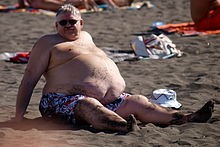No one wants to be obese and no one wants to be in pain. But could taking pain killers actually be part of the cause of obesity? Sunshine Coast chiropractor and holistic pain relief expert, Dr Paul Lanthois explains why he thinks painkilling medication could be a part of the obesity problem…

Does taking painkillers stop us from changing our own poor lifestyle habits?
When it comes to health there is an overabundance of conflicting theories on what is good and bad for your health. However, if there was one health fact that EVERYONE would agree on, it would be this….”Smoking, drinking to excess, being obese and doing little or no exercise is bad for your health“.
Interestingly, a National Health Survey on the use of medications conducted by the Australian Bureau of Statistics found, “People who reported what could be considered less healthy lifestyles were more likely to use pain relievers than those who lived healthier lifestyles.”
The survey revealed that people who: smoked, were obese, did little or no exercise, and drank alcohol to excess all had higher than normal use of pain-relieving medication.
So the question is…what caused what?
Does an unhealthy lifestyle lead to taking more pain relieving medication?
Or
Does taking more pain relieving medication lead to an unhealthy lifestyle?
It is well known that smoking, poor diet and drinking alcohol to excess promotes and accelerates inflammatory change within the body. Pain is also a sign of inflammation. So it makes sense that unhealthy lifestyles lead to the generation of more pain.
Dr Lanthois believes that this shouldn’t necessarily lead to the consumption of more pain-relieving medication.
Why not?
“Since the unhealthy lifestyle habits are the cause of your pain, changing unhealthy habits is how you fix the cause of your pain. Taking a pain reliever doesn’t address the cause of the pain at all. It simply covers up your feeling of pain.
This medication-first approach actually helps unhealthy habits (and their health effects) become more ingrained because it masks the build-up of inflammation caused by these unhealthy habits. As a result, you can continue causing inflammation through an unhealthy lifestyle without feeling the consequences of the damage you are inflicting on yourself. Inhibiting the sensation of pain deprives you of one of the best opportunities and motives to improve your lifestyle habits and health.”
He claims that taking pain killers prevents you from facing your pain and addressing it front on, which continues to feed the mentality of ignoring or suppressing the feedback from your body.
“This pattern of ignoring or not paying attention to your own body signals lies at the core of unhealthy habits like drinking to excess, smoking and overeating which can lead to all sorts of health problems including obesity. In reality, these unhealthy habits are a method of numbing or distracting you from your current physical or emotional pain.”
Considering the United States consumes 80% of the world’s pain medication, it is no surprise that the country’s obesity levels are reaching epidemic proportions and the healthcare ranking is the lowest among developed nations.
“The quality of your life and health is determined, in large part, by how you deal with pain,” states Dr Lanthois. “Avoiding, ignoring and medicating pain leads to prolonged suffering and poor health because painkillers never address the cause of the pain.”
Dr Lanthois recommends that people should consider putting aside the pills and embrace their pain.
“At the very least, respect your pain as valuable feedback that you should pay attention to. When you do you will find that your pain can even help you look at your overall health and your lifestyle habits and help motivate you to make a more positive lifestyle change. When that happens you not only help you heal the cause of your pain but heal your life as well.”
